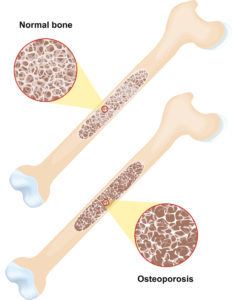
Your bones are the framework of your body. Not only do your bones help you move, they are strong enough to support your weight and protect your organs. They even store minerals and help with the production of blood cells. In order to keep your bones strong and healthy, doctors recommend certain lifestyle changes such as eating calcium rich foods, exercising regularly, quit smoking, and limiting caffeine and alcohol. Estrogen and vitamin D also play fundamental roles in skeletal growth and bone homeostasis in women by preventing osteoporosis, the thinning of bone tissue and loss of bone density over time. Osteoporosis occurs when the body fails to form enough new bone, when too much old bone is reabsorbed by the body, or both
Osteoporosis Risks for Female Breast Cancer Patients:
Estrogen is a hormone that is essential to female bone health because it controls the activity of osteoclasts, the cells that resorb bone. During normal menopause, women’s estrogen levels drop, but what many people don’t know is that chemotherapy can cause premature menopause due to damage to the ovaries. Chemotherapy also has a toxic effect on bone formation and can lower bone density over time. That’s why it’s important to speak with your cancer support team about tracking your bone density and determining the appropriate medications to take in order to prevent osteoporosis.
Research Findings:
Frederick R. Singer, M.D., Professor of Endocrinology and the Director of the Endocrine & Bone Disease Program at the Saint John’s Cancer Institute, specializes in metabolic bone disease and has long-term experience in osteoporosis which develops in cancer patients. With a team of physicians and researchers, Dr. Singer studied the effects of adjuvant chemotherapy on bone density in postmenopausal women with early-stage breast cancer. His study performed a chart review of breast center patients who had spine and hip bone density measured by dual-energy X-ray absorptiometry at our institution after receiving treatment for stage I or II breast cancer. The results found that women who were postmenopausal when they developed breast cancer and who received adjuvant chemotherapy, had lower bone density than those who did not.
Dr. Singer’s study finds that although the treatment of cancer patients can lead to long-term survival, certain treatment options can lower the estrogen hormone which is essential for female bone health as well as have a toxic effect on bone formation. Thus increasing the risk of osteoporosis over time if bone density is not monitored. Fortunately, this complication can be prevented by early evaluation of bone density at the time treatment begins and by appropriate use of medications which are very successful in preventing bone loss.
What is a Bone Density Test?
A bone density test can detect osteoporosis before a fracture occurs. A woman recovering from breast cancer should ask her doctor whether she might be a candidate for a bone density test. If the test shows a loss in bone density, there are several medications that can be taken to prevent bone loss.
Our specialists at the Saint John’s Cancer Institute have decades of experience in diagnosing and treating osteoporosis after cancer therapy in both men and women, and our senior physician, Dr. Frederick Singer is one of the leaders in the field internationally and nationally.
If you or a loved one has undergone hormonal therapy, chemotherapy, radiation therapy, or are still planning your breast cancer treatment options, contact us today to schedule an appointment for a bone density test to prevent bone loss and osteoporosis.
Schedule an appointment
Click below to read the full publication of Dr. Singer’s study.
View Publication


